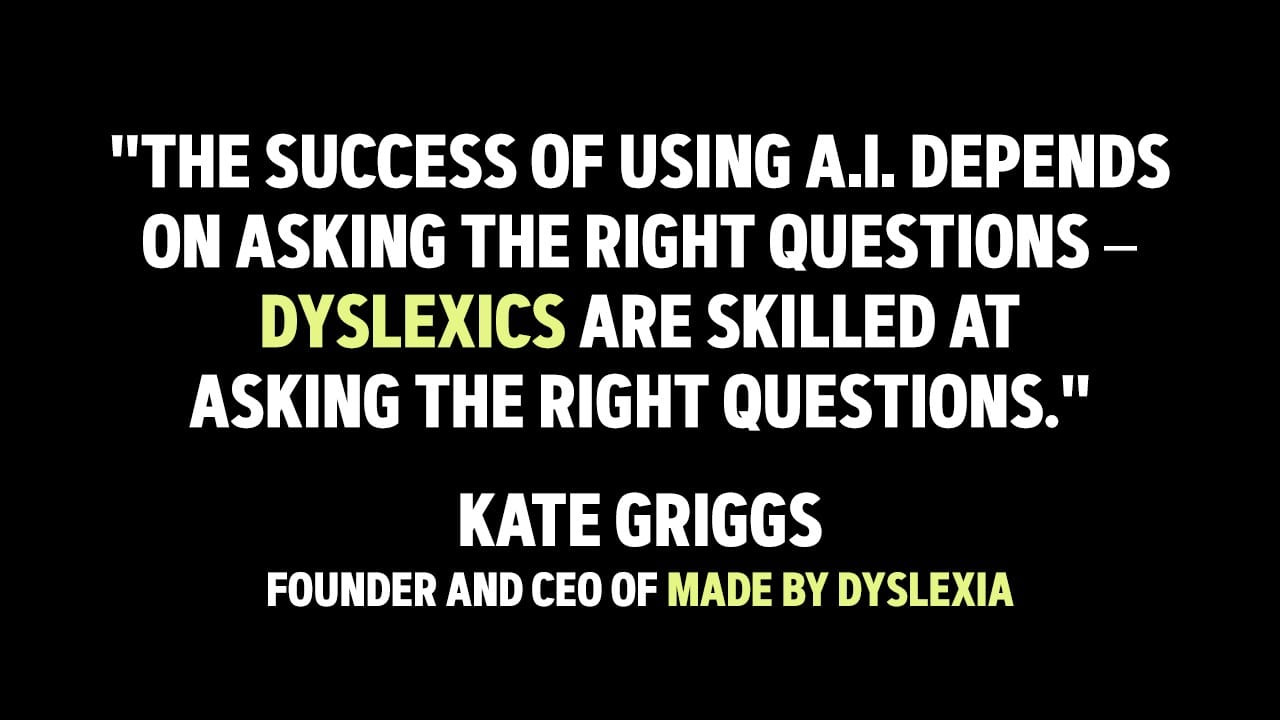It’s not AI Agents who will rule in a World of LLMs. Dyslexic thinkers will.
What Is Dyslexia (Simply Explained)?
Dyslexia messes with how your brain handles language.
It’s tough to break words into sounds or match them to letters, so reading, writing, and spelling take way more effort.
Before AI and Large Language Models (LLMs), dyslexic folks spent ages slogging through research or writing papers for school or work. Often, they’d need someone else to fix their grammar or proofread.
But things are different now.
Neurotypical vs. Dyslexic Thinkers
Let’s split it into two camps:
Neurotypical people think in straight lines. They use mental dictionaries, called lexicons with strict rules and definitions. They stick to catalogue of language words, like “How to Start a Business” or “How to write an email.”
Dyslexic thinkers? They see language as a web, images, connections, and possibilities all tangled together. It’s not linear; it’s holistic. That’s why they come up with wild, original ideas that break patterns.
Lexicon = Is the vocabulary of a language or branch of knowledge.
Linguistic theories generally regard human languages as consisting of two parts: a lexicon, essentially a catalogue of a language's words (its wordstock); and a grammar, a system of rules which allow for the combination of those words into meaningful sentences.
https://en.wikipedia.org/wiki/Lexicon
Why Dyslexic Thinking Outshines LLMs
LLMs have flipped the game. LLMs make everything that's not originally a commodity.
They’ve made standard knowledge cheap and easy to grab. All those old playbooks and templates built from lexicons? They’re losing their edge.
Regular thinking is outdated.
What’s valuable now is originality, fresh perspectives and creative sparks.
And when information becomes a commodity, the uniqueness of your cultural and individual identity is the extreme value that people will pay for.
That’s where dyslexic thinkers shine.
40% of the world’s greatest innovators and entrepreneurs are dyslexic.
Take dyslexic entrepreneurs like Richard Branson (Virgin), Ingvar Kamprad (IKEA), or Alexander Karp (Palantir). They didn’t follow the usual scripts. They rewrote the rules and flipped industries upside down with bold, unconventional moves.
Alexander Karp about Dyslexia & AI from 56:30m
My Story: Dyslexia & the Growth Mindset
I’ve got dyslexia, but I still nailed a Bachelor’s degree and an M.B.E. abroad.
How?
I figured out new ways to learn. Trying, tweaking, and testing different styles.
School kept telling me I wasn’t good enough, but that built resilience. Over time, I fell in love with learning and grew a Growth Mindset.
That fire pushed me to launch ventures in Edtech like Growth Tribe, Dutch Edtech, and TechMeUp.
Why This Matters Now
Dyslexic people have a cognitive superpower in an LLM-dominated world. Here’s why:
Divergent Thinking: When knowledge is everywhere, creativity solves the tough stuff. Dyslexics think outside the box naturally.
Experimentation: Normal methods never worked for them, so they’re pros at testing and iterating.
Adaptability: Dyslexics are curious, adaptable and embrace change and new ideas.
Comfort with Setbacks: Failure? It’s just feedback. They keep pushing forward.
Resilience: They’ve faced obstacles forever and bounced back stronger.
Holistic Thinking: They attack problems from all angles, spotting patterns others miss.
Delegation as a Strategic tool: Dyslexic entrepreneurs often excel at delegating tasks outside their strengths to focus on high-impact activities like vision-setting and team leadership.
Soft skills: AI will not replace soft skills and we need more to build effective teams who create high output.
Storytelling: Some dyslexics are highly skilled in storytelling (not written) to make it relatable and understandable in world where we get bombarded with information overload.
Prototyping: Dyslexics are not used to have stuff perfect. They iterate. Spot pattern connections and lean toward visual or spatial thinking. Which is great for prototyping.
And LLMs? They’re the perfect sidekick. They take away the grunt work that bogs dyslexics down:
Speech-to-Text: No more wrestling with writing or formatting, just talk it out.
Ideas to Plans: LLMs turn rough thoughts into solid, structured drafts.
Offloading Routine Tasks: More time for creative magic.
Dyslexics want to navigate ambiguity. LLMs handle the details. Together, it’s unstoppable.
The Real Winners
AI agents won’t rule the world. Dyslexic thinkers will.
They’re the ones dreaming up truly original cultural ideas and bold fixes for old problems.
AI can give you the right answers, but Dyslexics ask the right questions.
In a sea of sameness, they stand out.
Further reading:
Also read my blog “We Need to Listen More to System Breakers”, my lunch with Joris Luyendijk.
Or my interview with The Folks Magazine about my Dyslexic & Entrepreneurship:
Interview Palantir CEO Alexander Karp about Dyslexia
Great book: The Gift of Dyslexia by Ronald D Davis & Eldon M Braun.
Dyslexia Test or here.
It’s not AI Agents who will rule in a World of LLMs. Dyslexic thinkers will.





